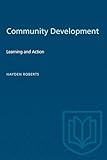Community Development : Learning and Action / Hayden Roberts.
Material type: TextSeries: HeritagePublisher: Toronto : University of Toronto Press, [1979]Copyright date: ©1979Description: 1 online resource (224 p.)Content type:
TextSeries: HeritagePublisher: Toronto : University of Toronto Press, [1979]Copyright date: ©1979Description: 1 online resource (224 p.)Content type: - 9780802063519
- 9781487575151
- 309.2/6 19
- HN980 .R8 1979eb
- online - DeGruyter
| Item type | Current library | Call number | URL | Status | Notes | Barcode | |
|---|---|---|---|---|---|---|---|
 eBook
eBook
|
Biblioteca "Angelicum" Pont. Univ. S.Tommaso d'Aquino Nuvola online | online - DeGruyter (Browse shelf(Opens below)) | Online access | Not for loan (Accesso limitato) | Accesso per gli utenti autorizzati / Access for authorized users | (dgr)9781487575151 |
restricted access online access with authorization star
http://purl.org/coar/access_right/c_16ec
Community development is often shaped by purely economic and political considerations, but it can also function as a process of education that expresses the perceptions of people and enhances their control of their society. Drawing on his experiences of economic models of development in Africa and Canada, Hayden Roberts design a practice theory of development that emerges from, and responds to, the needs of the community itself. His analysis emphasizes the political nature of the process and the central role of adult education in achieving the goals of a given community. His theory, in brief, is that affected people are more capable than outsider of perceiving and assessing the conditions of their lives, and that, with appropriate inspiration and guidance they can plan and act to change these conditions for the better. Theories of learning, communication, intergroup and interpersonal behaviour, organization, economic development, and political change are all utilized towards the formulation of a comprehensive theory and practical approach to community development planning. Roberts advances a people-oriented approach to development that draws its models from various disciplines and takes into account the local social, economic, and material needs of the community as well as the native abilities of the people concerned. His conclusions are equally relevant to third world societies and to minority groups or sub-cultures in industrialized societies, and they are presented with remarkable clarity and consciousness. He sifts through a maze of theories and emerges with a plausible theory of community development that is backed a every stage by the lessons of practical experience. The broadly based and humane work will interest all concerned with the process of community development, from planning to action.
Mode of access: Internet via World Wide Web.
In English.
Description based on online resource; title from PDF title page (publisher's Web site, viewed 01. Nov 2023)


